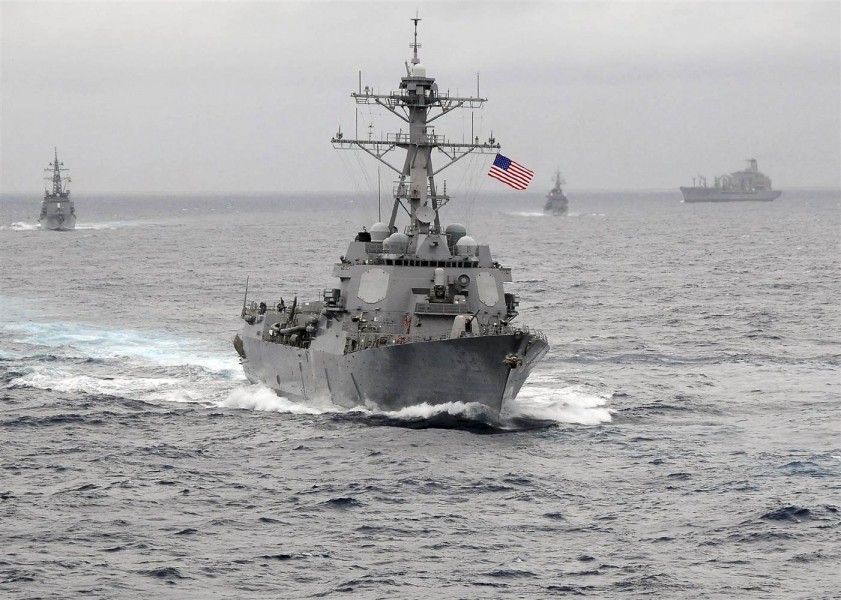A number of Chinese news media have denounced the presence of a US warship sailing near a number of disputed islands in the South China Sea recently, complaining that the USA was “harassing China” and that China was “not frightened to fight a war”.
The USS Lassen sailed into the Spratley archipelago on Tuesday last week, a disputed set of islands that have drawn claims of ownership from a number of Southeast Asian countries as well as China.
State-owned newspaper Global Times wrote in an op-ed saying: “In face of the U.S. harassment, Beijing should deal with Washington tactfully and prepare for the worst. This can convince the White House that China, despite its unwillingness, is not afraid to fight a war with the U.S. in the region, and is determined to safeguard its national interests and dignity.”
The Global Times also declared that “no country, the U.S. included, is able to obstruct Beijing’s island reclamation in the region.”
A Chinese-version of the Global Times op-ed went further by saying of the USA: “It can’t finish the situation in Iraq or Afghanistan; it dares only to make noise against Russia; it has failed to achieve anything in Syria; and it can’t really take down Pyongyang. China really hasn’t provoked it, but the US truly is only a ‘paper tiger’.”
Official state news agency Xinhua criticized “the lame-duck Obama administration” for trying to reassure its Asian allies “at a time when its so-called Asia Rebalance policy falters”, and warned that China “will take whatever means at whatever cost to safeguard its sovereign interests”.
The People’s Daily Online warned the USA by saying, “China never fears troubles, but the U.S. should never create troubles. If the U.S. plays with fire in South China Sea, the consequences will be very serious,” adding that “Troublemakers are bound to be condemned.”
Beijing has summoned the US Ambassador to protest, but they’ll get an even more formal opportunity to do so. On November 2, head of the US Pacific Command Harry B. Harris Jr will visit Beijing in order to discuss the situation in the South China Seas.
China has turned a number of reefs into islands in the Spratley archipelago system through a massive dredging project in 2013. Although China claims this is mainly for “civilian purposes”, Washington is claiming the facilities – including a two-mile long airstrip – are to reinforce its claim to a shipping zone in the area.
As the BBC reports, the 12-mile nautical zone can not be claimed for submerged features that were raised using artificial means.
In addition to the Spratley Islands, the Paracel Islands and the Scarborough Shoal are being contested by the Philippines, Vietnam, Malaysia, Brunei, and Taiwan.
Media aside, China’s political and military leaders have emphasized a need for peace, even when referring to the turmoil in the South China Sea.
China’s Central Military Commission Vice-Chairman Fan Changlong reassured the public last week by saying China “will never recklessly resort to the use of force,” even on issues regarding sovereignty. Having also said China “has done its utmost to avoid unexpected conflicts”, Fan’s words followed the construction of two lighthouses opposed by the USA and the Philippines who argue these land reclamation projects can be used for military purposes.
And during the September 3 military parade commemoration of the end of World War II, Chinese President Xi Jinping said, “In the interest of peace, China will remain committed to peaceful development. We Chinese love peace. No matter how much stronger it may become, China will never seek hegemony or expansion.”
On the same day, five Chinese warships were seen in the Bering Strait off the coast of Alaska. According to Pentagon spokesman Captain Jeff Davis, it marked the first time the United States had seen Chinese navy ships in the Bering Sea.

